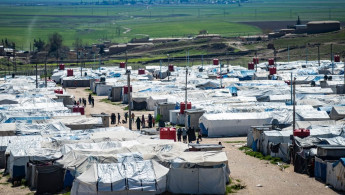Sweden repatriates women, children from northeast Syria
Sweden repatriated two women and four children from northeast Syria on Thursday, the day after the area's Kurdish-led authorities announced the end of a deadly prison stand-off in the city of Hasakeh.
The six Swedes were met at Stockholm's Arlanda airport by the authorities, Swedish foreign minister Ann Linde told SVT.
The women were arrested by police on suspicion of war crimes, the Public Prosecutor's Office said, while the children were taken in by social services.
The Al-Hol and Roj camps in northeastern Syria's Hasakeh province are home to about 60,000 people, mostly women and children relatives of Islamic State (IS) fighters, from dozens of countries worldwide.
Human rights groups and the Kurdish-led authorities administering the dangerous camps have long urged countries to take back their citizens. Western European countries have pushed back against the repatriations, citing security risks.
Swedish women and children are being held at the Roj camp, home to "lower risk" foreign nationals.
According to Swedish foreign ministry figures, there were 30 Swedish nationals - ten women and 20 children - held at Roj camp, before two repatriations took place in autumn 2021.
Three women and six children were repatriated from northeast Syria in September 2021. Another three women and eight children were repatriated in October.
The foreign ministry told The New Arab in September that there was "some uncertain and unconfirmed information about a small number of women and children with ties to Sweden in the al-Hol camp".
It said it had "no information to share" on Swedish nationals held in northeast Syria prisons.
UNICEF on Thursday urged countries to repatriate children held at camps and prisons in northeast Syria, after a six-day standoff between the Kurdish-led Syrian Democratic Forces (SDF) and IS fighters for control of Ghwayran prison that left at least 180 people dead and 6,000 people.
Nearly 850 children were trapped in the prison during the siege, with rights groups warning that some of them were injured and without food and water.
"UNICEF urges all member states involved to take urgent action and responsibility in the best interest of children and bring children and their mothers back to their country of origin," the UN's children's agency said in a statement.





 Follow the Middle East's top stories in English at The New Arab on Google News
Follow the Middle East's top stories in English at The New Arab on Google News


